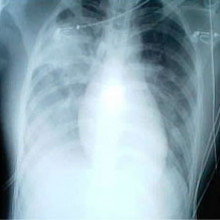SARS-predisposing gene identifed, post-SARS exposure screening to being in Hong Kong, GM-crops interbreeding with wild relatives, an update on SARS with virologist Professor Stuart Siddell, and interview guest Prof. Martin Raff "Stem cells - what are they and how can they be used?"
In this episode
Can Gm Crops Interbreed Wth Their Wild Relatives ?
It's been an exciting week for those interested in GM plant technology with the publication of a report from the University of Reading, investigating the risk of GM crops breeding with our native plants. The team have been using satellite imaging and DNA analysis to look at the amount of crossbreeding between commercial oilseed rape and a wild version of the plant, and predict how many hybrid plants might results if GM crops were to be grown in the UK. These hybrids are especially likely to be found in areas where crops grow close to rivers, particularly in Eastern Central England (our broadcast area). This research suggests that just isolating GM crops might not be enough to stop genes transferring into wild plants, but we don't yet know what the effects of this gene transfer might be. The researchers say that the presence of hybrids is not a hazard in itself and does not imply inevitable ecological change, but the results are useful to predict national levels of the risk of gene transfer from GM rapeseed as well as other crops. This week sees the publication of results from field trials of GM crops, adding more fuel to the debate about the merits and problems of the new technology. One of our guests next week will be . She's one of the researchers involved in the hybridisation study and is coming in to discuss the significance of the new results.
Stem Cell Links:
Interview with stem cell researcher Clive Svendsen about stem cell technology

- Gene Predisposing To SARS Identified
Gene Predisposing To SARS Identified
Scientists in Taiwan may have found a gene that makes people more susceptible to the deadly SARS virus, and this may explain why South east Asia was so badly hit by the disease.
The gene variant they think is linked with susceptibility to the SARS, is prominent in people of South Chinese Origin and the team hope to able to use the gene for a screening program for health care workers at greater risk of contracting SARS.
This may help explain why so few cases of SARS were seen in Europeans, since the gene is rare amongst the European population.
In other news this week, researchers in Canada have taken a step towards developing a vaccine for SARS using DNA sequences from the virus to modify a common cold-causing adenovirus, which it's hoped will eventually infect people and provoke an immune response against the disease.

- 10,000 To Be Screened in Hong Kong For SARS Exposure
10,000 To Be Screened in Hong Kong For SARS Exposure
Scientists in Hong Kong are planning to screen 10,000 citizens to find out how many may have been infected with SARS without realising it.
The researchers will be looking for antibodies in the bloodstream to SARS, indicating that a person has previously been infected and has since cleared the virus from their body.
By studying people like this, who have naturally fought off SARS without becoming seriously unwell, the researchers are hoping to learn why the infection is more severe in some people than others, and possibly find new ways to prevent or treat it.
Related Content
- Previous GM Crops, Noses and Coffee
- Next How the Sun Works









Comments
Add a comment